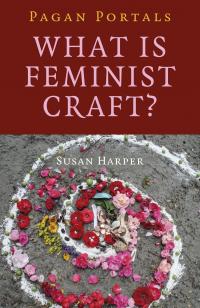

October in the Wheel of the Year: Old Age, Autumn Fairs and Apples - By Lucya Starza
While Samhain is the major Wheel of the Year event in October for pagans, there are other festivals and feast days earlier in the month.
Today, October 1st, is older person’s day. This international event to raise awareness about the problems of old age was started in 1990. It reflects on a topic that’s increasingly relevant as people live longer. As pagans we respect the wisdom of our elders, but as individuals it can be a useful reminder to keep in touch with our older living relatives. In the community book Every Day Magic, Imelda Almqvist wrote about this day:
“Young people in our culture often do not believe ‘old age’ will happen to them. Because we have become youth-obsessed we have lost a great resource: elders in our community who share wisdom, knowledge and traditions with younger generations. Meditate on the importance of elders. Find an elder tree and spend 15 minutes in meditation honouring the people who are (or were) elders in your life and helped shape your life. Send them gratitude!”
On a slightly similar theme, October 2nd is Braughing Old Man’s Day. Back in the sixteenth century a resident of the Hertfordshire village, Mathew Wall, had a lucky escape from being buried alive, thanks to some fallen autumn leaves. He’d been found, supposedly dead, and a procession including his fiancée was following his coffin on the way to his grave. One of the pallbearers slipped on leaves and dropped the casket. It fell to the ground with a thump, but the mourners were then shocked to hear banging from inside. It seemed the jolt had woken Mathew from a narcoleptic sleep and saved him from being buried alive. He married his sweetheart and lived another 24 years. In his will he left money that every October 2nd the bells would ring a wedding peal and Fleece Lane, the site of the incident, would be swept clean. The custom continues to this day.
Two hugely influential ceremonial magicians had their birthdays in October. Arthur Edward Waite, who wrote many books on magic as well as being the co-creator of Rider-Waite-Smith tarot deck, was born on October 2nd. Aleister Crowley was born on October 12th. As well as being the founder of Thelema, he created the Thoth tarot deck along with artist Lady Frieda Harris. In memory of these important occultists, why not read their writings and look at the tarot decks they created?
October 13th is Fontinalia, the Roman festival of springs in honour of Fons, god of pure water. This would be a good day to visit a well or spring near where you live. In Ancient Rome, wells were dressed with flower garlands, but if you’re intending to honour the deity of the water, check whether the local regulations and customs allow you to leave anything except your respects. Even flower petals can potentially cause a problem if too many are thrown in. Never leave anything unless it’s completely biodegradable and non-toxic. What you could do instead to promote clean water and help the environment is clear rubbish away.
Steve Roud, in The English Year, writes that many trade and agricultural fairs took place in October. Some still do. They were often for buying and selling livestock, but those that survive are now often more general. Examples include goose fairs in Tavistock and Nottingham; Pack Monday fair in Dorset; Weyhill Fair in Hampshire; and Bampton Fair in Devon.
In England, Apple Day is on October 21st. This is another modern festival, launched in 1990 by the charity Common Ground. It celebrates the fruit and aims to raise awareness about local varieties. Common Ground uses the apple as a symbol of physical, cultural and genetic diversity. In London, Borough Market usually holds an Apple Day festival in October. It’s run by The Lion’s Part, who also put on mummer’s plays at 12th Night. This year the activities will be online. You can find out more at www.thelionspart.co.uk
Apples are highly magical fruit. According to Rachel Patterson in A Kitchen Witch's World of Magical Food, they’re symbolic of abundance and excellent to use in spells to contact spirits, fairies or ancestors. Magical uses include love, healing, clarity, knowledge, abundance and spirit work. They’re also part of the traditional food and customs for both Samhain and Halloween, which I’ll be writing about later.
The agricultural cycle always goes on. While the grain might have been harvested in September, October was the month to start the new cycle by sowing wheat seeds for the following year, according to Steve Roud. In many parts of England this was celebrated by baking seed cakes, or siblett cakes, to share with friends and family. One traditional recipe from Northamptonshire contains 1lb flour, 1lb sugar, 1lb butter, 8 eggs, 2oz caraway seeds and 1 grated nutmeg. To make it you beat the butter, beat in the egg whites then the yolks and finally the flour and spices. Bake it in a cake tin in a hot oven for 1 and a half hours. That would make a huge cake for sharing.
According to Rachel Patterson, caraway seeds are good for health, protection and fidelity magic. They can ward against unwanted guests and the fair folk. Rachel adds that caraway seeds are perfect for use in initiation rites, so you could bake a seed cake when welcoming a new member to a coven or dedicating yourself as a witch.
I’ll be writing about the customs of Samhain and Halloween later in October.
This is the ninth in a series of posts I’m writing for the Moon Books Blog on the theme of the Wheel of the Year. My posts will be compiled and edited into a book: Pagan Portals – Wheel of the Year. Other books by Lucya Starza in the Pagan Portals series include Candle Magic, Guided Visualisations, Poppets and Magical Dolls, and Scrying. Lucya edited the community book Every Day Magic – A Pagan Book of Days.
Categories:
0 comments on this article






